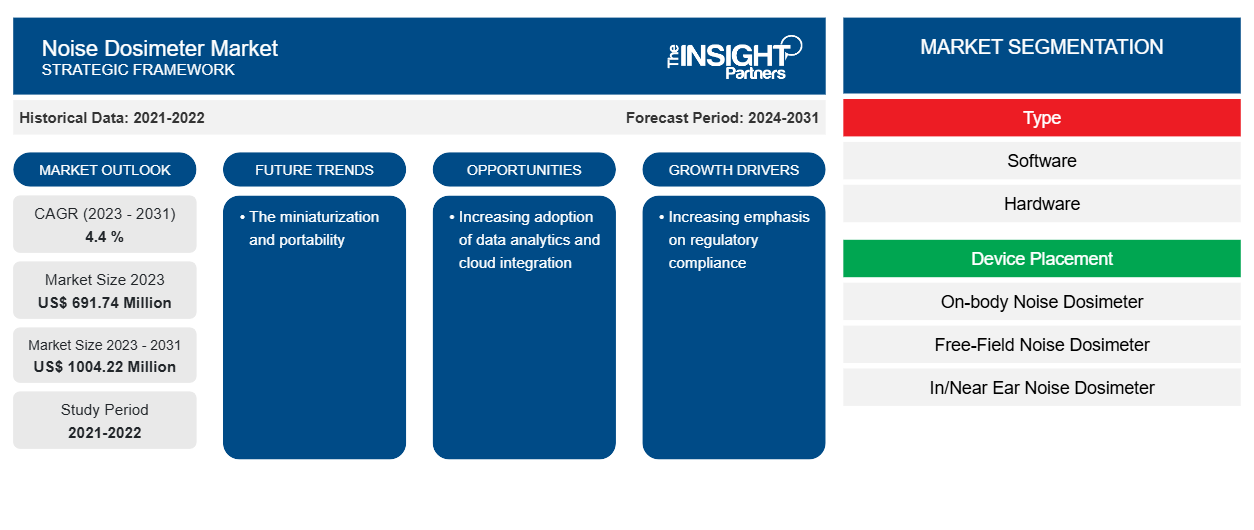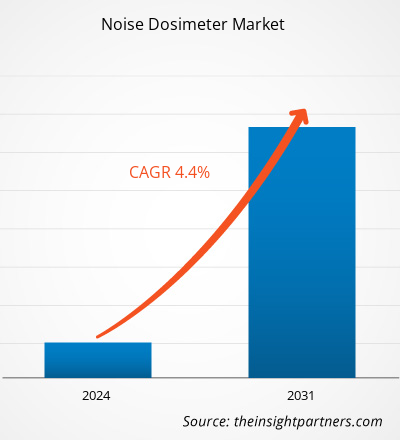Noise Dosimeter Market Dynamics and Trends by 2031
Noise Dosimeter Market Size and Forecast (2021 - 2031), Global and Regional Share, Trend, and Growth Opportunity Analysis Report Coverage: By Type (Software and Hardware), Device Placement (On-body Noise Dosimeter, Free-Field Noise Dosimeter, and In/Near Ear Noise Dosimeter), and Application (Aerospace and Defense, Automotive, Construction, and Factories and Enterprises) and Geography.
Historic Data: 2021-2022 | Base Year: 2023 | Forecast Period: 2024-2031- Report Date : Apr 2026
- Report Code : TIPEL100001356
- Category : Electronics and Semiconductor
- Status : Data Released
- Available Report Formats :


- No. of Pages : 150
The noise dosimeter market size is projected to reach US$ 1004.22 million by 2031 from US$ 691.74 million in 2023. The market is expected to register a CAGR of 4.4 % during 2023–2031. The miniaturization and portability is likely to remain a key trend in the market.
Noise Dosimeter Market Analysis
The demand for the market is attributed to the increasing use of personal noise dosimeters. For today's health and safety professionals and industrial hygienists, workplace noise measures are essential. Many manufacturing facilities in the industrialized world still have high levels of noise. Various regions prefer to use a personal device to verify a worker's noise dose. At the same time, other nations utilize a combination of hand-held noise level meters and a lesser number of personal noise dosimeters. For a busy person who may have numerous additional risks to cope with in the office, the advantages of a personal noise dosimeter are many systems that are currently in use with new ones.
Noise Dosimeter Market Overview
No single method or method exists for measuring professional noise. Hearing safety and health professionals can utilize various instruments to measure noise and can choose from several instruments and software to examine their measurements. The choice of a specific instrument and approach for analyzing and measuring occupational noise depends on various factors, not the least of which will be the reason for the measurement and the environment in which the measurement will be made. The process of measuring noise with a sound level meter is relatively straightforward when the noise levels are constant and when the worker remains essentially stationary during the work shift. A noise dosimeter is recommended for measuring a worker's noise exposure when the noise levels are varying or intermittent.
Customize This Report To Suit Your Requirement
Get FREE CUSTOMIZATIONNoise Dosimeter Market: Strategic Insights

-
Get Top Key Market Trends of this report.This FREE sample will include data analysis, ranging from market trends to estimates and forecasts.
Noise Dosimeter Market Drivers and Opportunities
Increasing emphasis on regulatory compliance
The multi-channel noise dosimeter allows for simultaneous measurement of all of the parameters needed to assess the noise exposures of workers and to select hearing protection using either SNR, HML or Octave Bands. Each channel can be individually configured to meet any noise measurement standard, regulation, or guideline. This allows the dosimeter to measure a wide range of data and provide the information that is required to meet any occupational noise standards. Thus, with increasing emphasis on regulatory compliance, the demand for noise dosimeters is increasing.
Increasing adoption of data analytics and cloud integration
The next big noise measurement revolution is likely to alter how the noise is measured and monitored. The integration of cloud technology into noise magnitude is a watershed moment for the industry that promises to develop the way organizations around the world protect their employees and the environment from the risks of extreme noise exposure. Cloud-connected noise observers can be installed at various locations on one site or across numerous, covering as large a geographical area as possible. Cloud technology overcomes the challenges encountered by multi-site operations and promises to make noise monitoring more efficient and accessible than conventional methods. Thus, the increasing adoption of data analytics and cloud integration is creating more opportunities for the market.
Noise Dosimeter Market Report Segmentation Analysis
Key segments that contributed to the derivation of the noise dosimeter market analysis are type, device placement, and application.
- Based on the type, the noise dosimeter market is divided into hardware and software. The software segment held a larger market share in 2023.
- By device placement, the market is segmented into on-body noise dosimeters, free-field noise dosimeters, and in/near ear noise dosimeters.
- By application, the market is segmented into aerospace and defense, automotive, construction, and factories and enterprises.
Noise Dosimeter Market Share Analysis by Geography
The geographic scope of the noise dosimeter market report is mainly divided into five regions: North America, Asia Pacific, Europe, Middle East & Africa, and South & Central America.
APAC dominates the noise dosimeter market. The estimation of industrial noise differs substantially from that of transportation noise. Contrasting transportation noise, which can be projected using a collection of input datasets, there are no similar approaches for industrial noise. The only way to determine how much an industrial source emits is to determine it. The rise in industrial noise emissions and the acute need to control the same is causing the adoption of noise dosimeters among several industries in APAC.
Noise Dosimeter
Noise Dosimeter Market Regional Insights
The regional trends influencing the Noise Dosimeter Market have been analyzed across key geographies.
Noise Dosimeter Market Report Scope
| Report Attribute | Details |
|---|---|
| Market size in 2023 | US$ 691.74 Million |
| Market Size by 2031 | US$ 1004.22 Million |
| Global CAGR (2023 - 2031) | 4.4 % |
| Historical Data | 2021-2022 |
| Forecast period | 2024-2031 |
| Segments Covered |
By Type
|
| Regions and Countries Covered |
North America
|
| Market leaders and key company profiles |
|
Noise Dosimeter Market Players Density: Understanding Its Impact on Business Dynamics
The Noise Dosimeter Market is growing rapidly, driven by increasing end-user demand due to factors such as evolving consumer preferences, technological advancements, and greater awareness of the product's benefits. As demand rises, businesses are expanding their offerings, innovating to meet consumer needs, and capitalizing on emerging trends, which further fuels market growth.

Noise Dosimeter Market News and Recent Developments
The noise dosimeter market is evaluated by gathering qualitative and quantitative data post primary and secondary research, which includes important corporate publications, association data, and databases. A few of the developments in the noise dosimeter market are listed below:
- TSI introduced the latest in noise dosimetry with the launch of the all-new Quest™ Edge 7 Personal Noise Dosimeter. In noisy work environments, protecting workers’ hearing is crucial to staying safe and healthy. The TSI® Quest™ Edge Personal Noise Dosimeter is a powerful and intuitive instrument designed to identify hearing loss threats and inform the design of hearing protection programs and engineering controls. (Source: TSI, Press Release, July 2023.)
- Introducing the NEW SKC NoiseCHEK Personal Noise Dosimeter Excessive exposure to high levels of noise in the workplace can cause hearing loss and other health issues in workers and is hence regulated with noise exposure standards established by Safe Work Australia. Using the appropriate safety equipment to ensure noise exposure never exceeds the 85-decibel 8-hour average or 140-decibel peak is vital in keeping your team safe. (Source: SKC NoiseCHEK, Press Release, September 2023)
Noise Dosimeter Market Report Coverage and Deliverables
The “Noise Dosimeter Market Size and Forecast (2021–2031)” report provides a detailed analysis of the market covering below areas:
- Noise dosimeter market size and forecast at global, regional, and country levels for all the key market segments covered under the scope
- Noise dosimeter market trends, as well as market dynamics such as drivers, restraints, and key opportunities
- Detailed PEST/Porter’s Five Forces and SWOT analysis
- noise dosimeter market analysis covering key market trends, global and regional framework, major players, regulations, and recent market developments
- Industry landscape and competition analysis covering market concentration, heat map analysis, prominent players, and recent developments in the noise dosimeter market
- Detailed company profiles
Frequently Asked Questions
Naveen is an experienced market research and consulting professional with over 9 years of expertise across custom, syndicated, and consulting projects. Currently serving as Associate Vice President, he has successfully managed stakeholders across the project value chain and has authored over 100 research reports and 30+ consulting assignments. His work spans across industrial and government projects, contributing significantly to client success and data-driven decision-making.
Naveen holds an Engineering degree in Electronics & Communication from VTU, Karnataka, and an MBA in Marketing & Operations from Manipal University. He has been an active IEEE member for 9 years, participating in conferences, technical symposiums, and volunteering at both section and regional levels. Prior to his current role, he worked as an Associate Strategic Consultant at IndustryARC and as an Industrial Server Consultant at Hewlett Packard (HP Global).
- Historical Analysis (2 Years), Base Year, Forecast (7 Years) with CAGR
- PEST and SWOT Analysis
- Market Size Value / Volume - Global, Regional, Country
- Industry and Competitive Landscape
- Excel Dataset
Recent Reports
Testimonials
The Insight Partners' SCADA System Market report is comprehensive, with valuable insights on current trends and future forecasts. The team was highly professional, responsive, and supportive throughout. We are very satisfied and highly recommend their services.
RAN KEDEM Partner, Reali Technologies LTDsI requested a report on a very specific software market and the team produced the report in a few days. The information was very relevant and well presented. I then requested some changes and additions to the report. The team was again very responsive and I got the final report in less than a week.
JEAN-HERVE JENN Chairman, Future AnalyticaWe worked with The Insight Partners for an important market study and forecast. They gave us clear insights into opportunities and risks, which helped shape our plans. Their research was easy to use and based on solid data. It helped us make smart, confident decisions. We highly recommend them.
PIYUSH NAGPAL Sr. Vice President, High Beam GlobalThe Insight Partners delivered insightful, well-structured market research with strong domain expertise. Their team was professional and responsive throughout. The user-friendly website made accessing industry reports seamless. We highly recommend them for reliable, high-quality research services
YUKIHIKO ADACHI CEO, Deep Blue, LLC.This is the first time I have purchased a market report from The Insight Partners.While I was unsure at first, I visited their web site and felt more comfortable to take the risk and purchase a market report.I am completely satisfied with the quality of the report and customer service. I had several questions and comments with the initial report, but after a couple of dialogs over email with their analyst I believe I have a report that I can use as input to our strategic planning process.Thank you so much for taking the extra time and making this a positive experience.I will definitely recommend your service to others and you will be my first call when we need further market data.
JOHN SUZUKI President and Chief Executive Officer, Board Director, BK TechnologiesI wish to appreciate your support and the professionalism you displayed in the course of attending to my request for information regarding to infectious disease IVD market in Nigeria. I appreciate your patience, your guidance, and the fact that you were willing to offer a discount, which eventually made it possible for us to close a deal. I look forward to engaging The Insight Partners in the future, all thanks to the impression you have created in me as a result of this first encounter.
DR CHIJIOKE ONYIA MANAGING DIRECTOR, PineCrest Healthcare Ltd.Reason to Buy
- Informed Decision-Making
- Understanding Market Dynamics
- Competitive Analysis
- Identifying Emerging Markets
- Customer Insights
- Market Forecasts
- Risk Mitigation
- Boosting Operational Efficiency
- Strategic Planning
- Investment Justification
- Tracking Industry Innovations
- Aligning with Regulatory Trends





 Get Free Sample For
Get Free Sample For